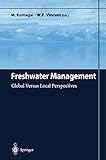Freshwater management: global versus local perspectives [Libro electrónico] / editores: Michio Kumagai, Warwick F. Vincent
Kumagai, Michio [editor] | Vincent, Warwick F [editor/a].
Tipo de material: Libro
en línea Editor: Otsu, Japan: Springer-Verlag, c2003Descripción: xiii, 233 páginas : ilustraciones ; 24 centímetros.ISBN: 4431004882; 9784431684381 (Print); 9784431684367 (Online).Tema(s): Freshwater ecology | Ecosystem management | Water quality managementNota de acceso: Disponible para usuarios de ECOSUR con su clave de acceso Nota de bibliografía: Incluye bibliografía e índice: páginas 229-233 Número de sistema: 56625Contenidos:Mostrar
Resumen:
Libro
en línea Editor: Otsu, Japan: Springer-Verlag, c2003Descripción: xiii, 233 páginas : ilustraciones ; 24 centímetros.ISBN: 4431004882; 9784431684381 (Print); 9784431684367 (Online).Tema(s): Freshwater ecology | Ecosystem management | Water quality managementNota de acceso: Disponible para usuarios de ECOSUR con su clave de acceso Nota de bibliografía: Incluye bibliografía e índice: páginas 229-233 Número de sistema: 56625Contenidos:Mostrar
Resumen:| Tipo de ítem | Biblioteca actual | Colección | Signatura | Estado | Fecha de vencimiento | Código de barras |
|---|---|---|---|---|---|---|
| Libros | Biblioteca Electrónica Recursos en línea (RE) | Acervo General | Recurso digital | ECO400566254967 |
Incluye bibliografía e índice: páginas 229-233
1. Lessons from lake Biwa and other Asian lakes: global and local perspectives.. 2. Perspectives on environmental monitoring.. 3. Approaches towards environmental restoration.. 4. Strategies for ecological modeling.. 5. Recovery from eutrophication.. 6. Requirements for lake management.. 7. Global and local approaches to freshwater management: the way ahead.. Index
Disponible para usuarios de ECOSUR con su clave de acceso
The globalization of trade, monetary and fiscal policies, capital markets, and investment patterns is reshaping the world economy and is leading to new financial, commercial, and marketing structures as well as unprecedented economies of scale. Simultaneously, national and international awareness and to strengthen. There is consensus among responses to accelerating environmental degradation continue most developed countries that the rapidly evolving new economic order needs to be well integrated with policies to maintain or restore environmental quality. Many challenges remain, however, in evaluating the geo-ecological implications of economic globalization, and in formulating the appropriate management responses. In lakes and rivers, the management of water supply and quality has largely proceeded on the basis of local considerations rather than at the global scale that has been more typical of environmental management of the atmosphere and ocean. It is increasingly apparent, however, that high-quality water resources are now in critically short supply not only because of local problems such as over-irrigation and eutrophication, but also as a result of larger-scale climate effects on the hydrosphere. This magnitude of impact will increasingly require the integrated monitoring and management of water resources on a planetary scale, with world criteria for environmental assessment, restoration, and conservation strategies. The increasing extent of world trade in potable freshwater heightens the urgency for establishing international approaches, criteria, and regulations. eng
Disponible en línea
Adobe Acrobat profesional 6.0 o superior
Subscripción a ELSEVIER 26 de diciembre del 2013
